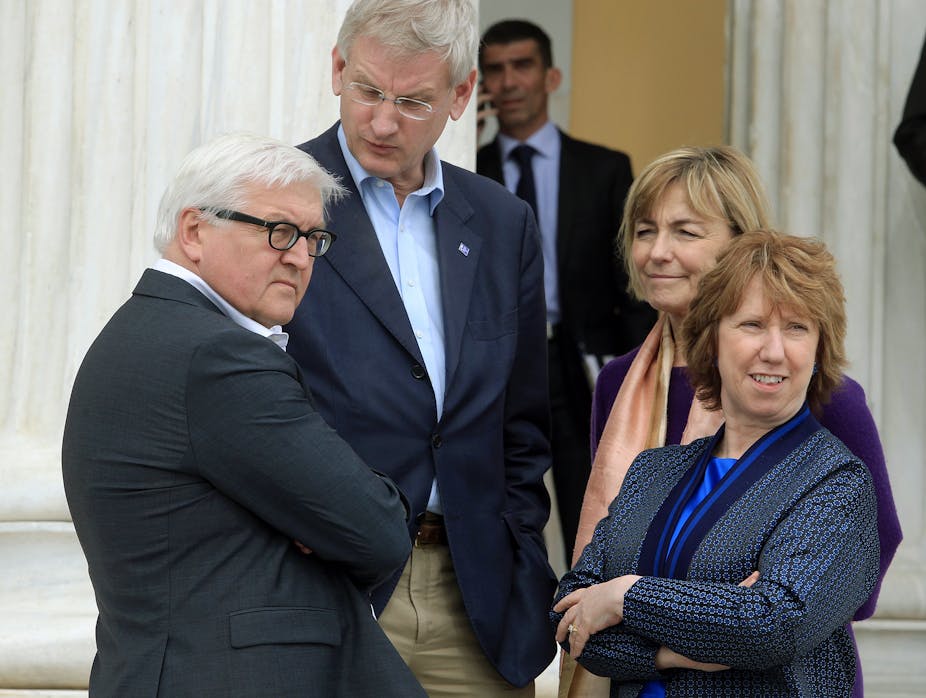Europe’s neighbourhood is in flames. To the south, the optimism provoked by the Arab spring quickly gave way to concern about successor regimes. To the east, all eyes are on Ukraine as some 40,000 Russian troops equipped with fighter jets and tanks amass on the border, and Moscow completes its annexation of what was recently an integral part of a state aspiring to EU membership.
Unrest in the near abroad clearly represents a threat to European stability. It has also been seen as a humiliation for the European Neighbourhood Policy, a flagship EU strategy intended, in the words of the European Commission, to share “the benefits of the EU with neighbouring countries, thus strengthening stability, security and well-being”.
That stability, security and well being are in short supply in the States in question is hardly open to question. Yet, while it is all too easy simply to blame the European Union for this failure, it is also profoundly unfair.
For one thing, the current crises owe much to factors outside European control. Powerful domestic forces in Syria, Libya, Egypt and Ukraine have helped to generate often unpredictable outcomes. Second, in both their eastern and southern neighbourhoods, Europeans now confront powerful rivals unwilling simply to stand by and watch the EU go about its business. Gulf states are more than happy to pay handsomely to keep the Muslim Brotherhood out of power - whatever the democratic implications - while Russia continues decisviely to shape developments in the Caucasus.
Finally, much of the responsibility for Europe’s inability to wield the influence it badly wants lies not with with the Union itself, but rather with national governments. The Ukraine crisis provides a salutary example. During the autumn of 2013, Kiev and the EU were hard at work negotiating a Deep and Comprehensive Free Trade Agreement with the EU. As is well known, Ukraine’s then-president Viktor Yanukovych ultimately refused to sign the deal, resulting in protests, a subsequent crackdown, the overthrow of his regime and ultimately Russia’s intervention in Crimea.
An overplayed hand
Prior to the summit in Vilnius intended to inaugurate a new era of co-operation with Ukraine, it was those member states most invested in this relationship that drove EU diplomacy. Lithuania, holder of the EU presidency, was desperate to seal a deal while at the helm. So too was Poland, a country with particularly close ties to Kiev, and whose foreign minister, Radoslaw Sikorski – never a shrinking violet – was anxious to raise his own profile and ultimately secure a top EU job for himself. Together, they whipped up enthusiasm for a deal amongst pro-Western forces in Ukraine.
But the headlong push for success at Vilnius was naive. First, it overlooked Russian interests and the fact that Moscow was simply not willing to see Ukraine sign an agreement that would have been incompatible with membership of Russia’s own Eurasian Economic Union.
In addition, proponents of the deal failed to convince their own partners of its importance. Whether because preoccupied with their own internal economic problems, or because of their geographical distance from Europe’s eastern borders, several member states were reluctant to offer too much to Kiev. While what was offered promised significant long-term benefits, short-term gains fell well short of those offered by Russia as an incentive for Ukraine to walk away from the EU talks.
Crucially, member states were simply unable to agree to offer the ultimate prize of accession to the EU. Historically, this has been the only inducement capable of persuading neighbours to undertake the kinds of large-scale reform that were being demanded of Ukraine.
Equal pain for all
Geopolitical naivety and material insufficiency were hardly the basis for an effective approach to the Union’s Eastern neighbour. And the same divisions that spawned these have been all the more apparent since the crisis erupted in Crimea. While Poland and the Baltic states in particular pressed for a tough European reaction, Italy and Spain, among others, have been anxious not to undermine their improving links with the Kremlin.
Member states, in other words, are as anxious as ever to preserve their narrow national interests, even at the expense of collective foreign policy clout. At a recent seminar, a senior British official was heard to remark that the European response to Crimea should be based on the principle of “equal pain”. This was intended to imply not that Russia’s brazen flouting of international law should be met with a proportionate western response, but that any putative European sanctions should damage German and French interests as much as British ones.
Given this, it is important not to expect too much of Baroness Ashton as she prepares for discussions within the quad next week. The EU’s high representative has proved a formidable negotiator and mediator in some of the most intractable international disputes of our time – one thinks of the conflict between Serbia and Kosovo, or of the ongoing negotiations with Iran. Yet this has been possible only when member states could, between them, agree on what they want her to achieve. Over Ukraine, this has so far simply not been the case.
The EU offers a unique instrument via which member states can, collectively, wield far greater influence over world affairs – including in their own neighbourhood – than they could muster individually. Yet for the whole to empower the parts requires those parts to allow it to do so. However tempting it may be to portray the problems in the neighbourhood as a failing of “Brussels”, this is simply not the case.

